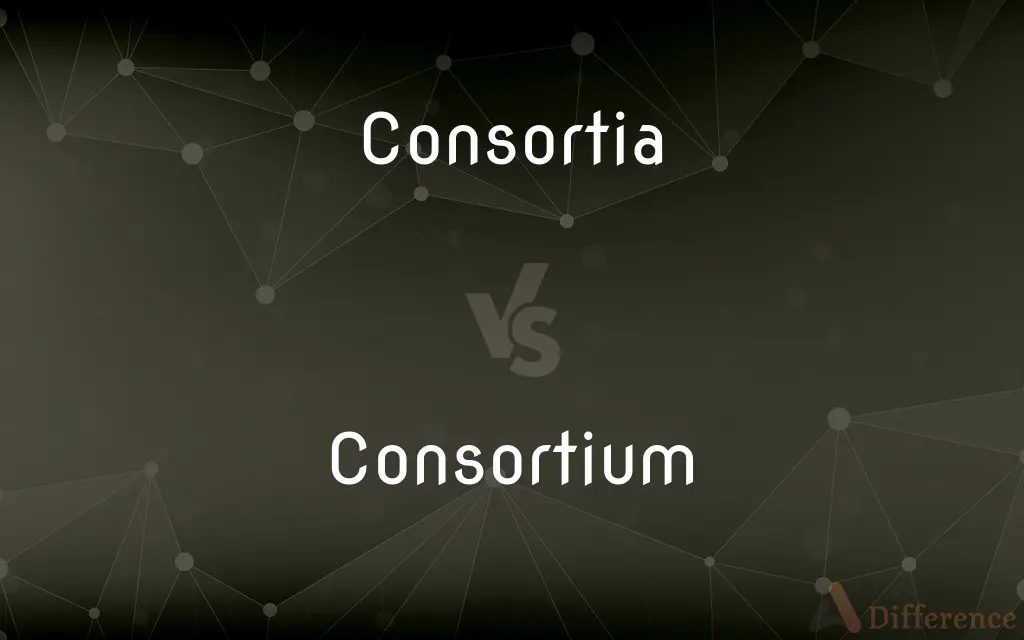Consortia vs. Consortium — What's the Difference?
By Fiza Rafique & Maham Liaqat — Updated on March 30, 2024
Consortia is the plural form of consortium, referring to groups or associations formed for a common purpose. Consortium denotes a single collaborative entity.

Difference Between Consortia and Consortium
Table of Contents
ADVERTISEMENT
Key Differences
A consortium is a collaborative association where two or more individuals, companies, or organizations come together to undertake a common project or to achieve a specific objective that is beyond the capacity of any single member. These members pool resources, share risks, and combine their expertise to achieve their mutual goals. Consortia, the plural form, indicates multiple such collaborative groups or alliances, each with its own set of members and objectives.
The concept of a consortium is commonly applied in the academic, business, and research fields, where organizations collaborate on large projects, such as developing new technologies, conducting significant research studies, or bidding for contracts. Each consortium operates as a single entity towards its goal, while consortia represent the broader landscape of collaborative efforts across various sectors and disciplines.
A single consortium can involve parties from different sectors, including public institutions, private companies, and non-profit organizations, each contributing according to its capabilities and interests. In contrast, when referring to consortia, it implies a discussion about multiple such collaborations, potentially highlighting the diversity and scale of cooperative efforts within or across industries.
The formation of a consortium is typically formalized through agreements that outline the roles, responsibilities, contributions, and benefits for each member. These agreements ensure that all parties are aligned towards the common objective and share in the risks and rewards. When speaking of consortia, this implies the existence of several such agreements, governing the operations of various collaborative ventures.
Understanding the distinction between consortium and consortia is crucial when discussing or engaging in collaborative projects. Using the correct term helps clarify whether the reference is to a single alliance or multiple alliances, thereby providing a clearer context for communication and analysis.
ADVERTISEMENT
Comparison Chart
Definition
The plural form of consortium, referring to multiple such entities.
A single collaborative entity formed by two or more parties for a common purpose.
Application
Used to discuss the landscape of collaborative efforts across sectors.
Often found in academia, business, and research for joint projects.
Membership
Refers to the members of multiple consortia, each with its own project.
Involves members from various sectors collaborating on a specific project.
Formalization
Implies multiple agreements for different collaborative ventures.
Through agreements that outline collaboration terms.
Purpose
Highlights the diversity and scale of cooperative efforts within or across industries.
To pool resources, share risks, and combine expertise for a mutual goal.
Compare with Definitions
Consortia
Several legal entities collaborating across different projects.
Consortia have been established worldwide to tackle pandemic-related challenges.
Consortium
A partnership in academia for shared resources.
A consortium of libraries allows students to access a vast array of resources.
Consortia
Partnerships across academia for enhancing educational resources.
International consortia of universities collaborate on exchange programs and joint research.
Consortium
A collaborative agreement between parties to work towards a common goal.
The university joined a consortium to research renewable energy solutions.
Consortia
Multiple groups or alliances each formed for collaborative purposes.
The conference attracted consortia from various industries to discuss climate change solutions.
Consortium
A legal entity formed by companies to bid on contracts.
The construction firms formed a consortium to bid for the large infrastructure project.
Consortia
Groups combining efforts for advancements in multiple technologies.
Tech consortia are leading the way in AI and machine learning research.
Consortium
A group of organizations combining efforts for technological advancement.
The technology consortium aims to develop next-generation network standards.
Consortia
Alliances for risk-sharing in various sectors.
Consortia in the pharmaceutical industry are crucial for speeding up vaccine development.
Consortium
An alliance for sharing risks in research and development projects.
Pharmaceutical companies formed a consortium to share the costs and risks of drug development.
Consortia
An association or a combination, as of businesses, financial institutions, or investors, for the purpose of engaging in a joint venture.
Consortium
A consortium (plural: consortia) is an association of two or more individuals, companies, organizations or governments (or any combination of these entities) with the objective of participating in a common activity or pooling their resources for achieving a common goal. Consortium is a Latin word meaning "partnership", "association" or "society", and derives from consors ("shared in property"), itself from con- ("together") and sors ("fate").
Consortia
A cooperative arrangement among groups or institutions
A library consortium.
Consortium
An association or a combination, as of businesses, financial institutions, or investors, for the purpose of engaging in a joint venture.
Consortia
An association or society.
Consortium
A cooperative arrangement among groups or institutions
A library consortium.
Consortia
Plural of consortium
Consortium
An association or society.
Consortium
An association or combination of businesses, financial institutions, or investors, for the purpose of engaging in a joint venture.
Consortium
A similar arrangement among non-commercial institutions or organizations.
Consortium
An association or society.
Consortium
(legal) The right of a spouse to all the normal relationships with his or her mate.
Consortium
(biology) A group of symbiotic microbes.
Consortium
An association of companies for some definite purpose
Common Curiosities
How does a consortium work?
It operates through agreements that define each member's role and share of resources, risks, and rewards.
What are the benefits of forming a consortium?
Benefits include pooled resources, shared risks, combined expertise, and access to new markets or technologies.
Can a consortium include competitors?
Yes, competitors can join a consortium to tackle projects that are beyond their individual capacities or to share risks.
What types of projects are suitable for consortia?
Suitable projects include those requiring significant investment, interdisciplinary research, or access to a wide range of resources.
What is the difference between a joint venture and a consortium?
A joint venture is a business entity created by two or more parties, with shared ownership and profits, while a consortium does not necessarily create a new entity and often focuses on a single project.
How do consortia impact innovation?
Consortia can accelerate innovation by facilitating collaboration and knowledge-sharing among diverse groups.
What is a consortium?
A consortium is a cooperative arrangement where two or more parties collaborate on a specific project or objective.
How is a consortium managed?
It is typically managed by a lead organization or through a governance structure agreed upon by all members.
Can an individual join a consortium?
Typically, consortia are formed by organizations, but individuals may participate as part of an organization or through special arrangements.
Can consortia be international?
Yes, consortia can be international, bringing together parties from different countries to work on global challenges.
Share Your Discovery

Previous Comparison
Capacity vs. Swamp
Next Comparison
Contacted vs. ContactableAuthor Spotlight
Written by
Fiza RafiqueFiza Rafique is a skilled content writer at AskDifference.com, where she meticulously refines and enhances written pieces. Drawing from her vast editorial expertise, Fiza ensures clarity, accuracy, and precision in every article. Passionate about language, she continually seeks to elevate the quality of content for readers worldwide.
Co-written by
Maham Liaqat











































